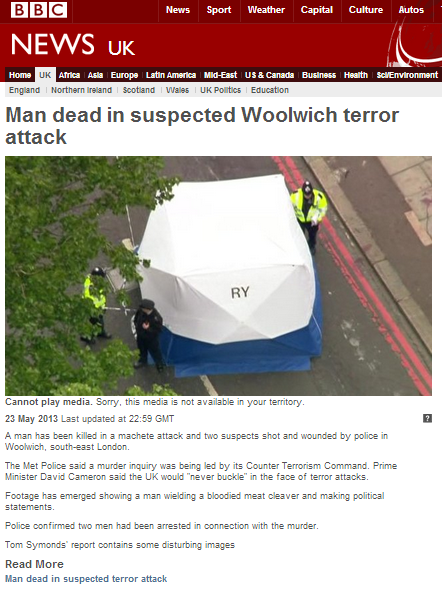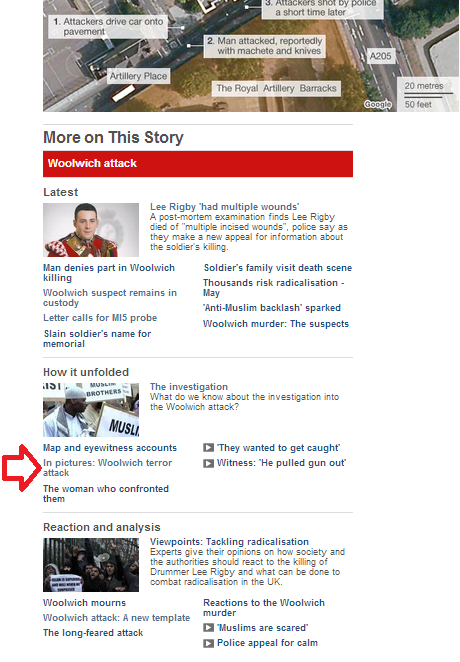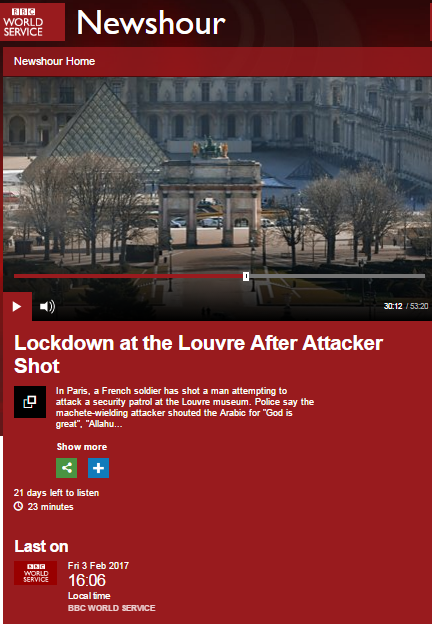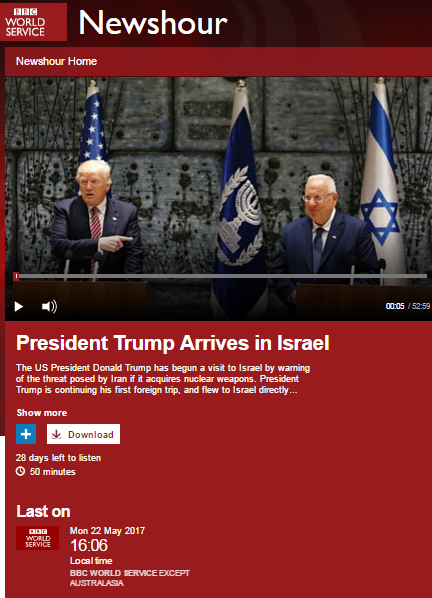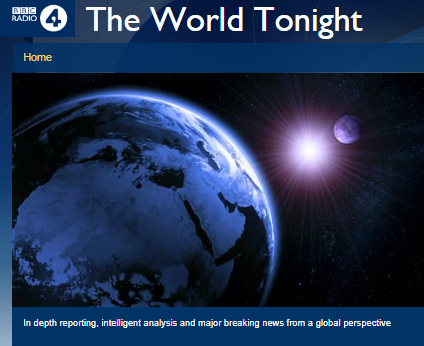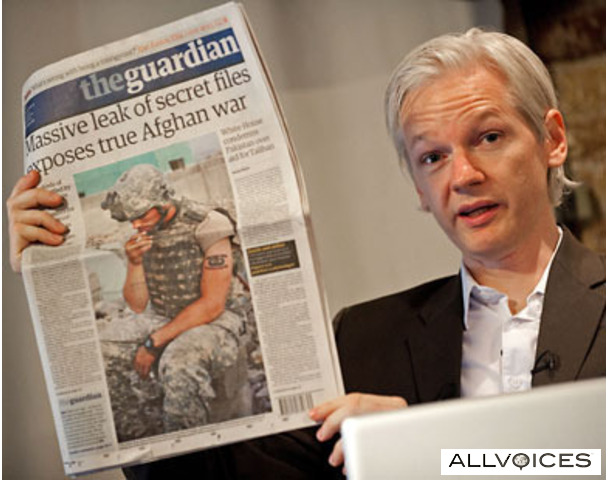At some point there is inevitably going to have to be a proper public debate on the subject of the BBC’s selective and politically motivated use of the word ‘terror’ and its derivatives, but so far it seems that the corporation is keen to avoid that debate, even in its own halls.
After the horrific murder of British soldier Drummer Lee Rigby on a London street last May, a member of the public contacted the BBC to point out the discrepancy between its (appropriate) use of the word ‘terror’ whilst reporting that incident and its practice of describing terrorism in Israel in euphemistic terms. 
In the second of two responses from the BBC Complaints unit, Mr Stephen Franklin was informed that:
“In http://www.bbc.co.uk/news/uk-22630304 the word “terrorist” is actually used in the context of being attributed to a third party or individual.
For example the link states that the:
“incident now being treated by the government as a suspected terrorist attack, says the BBC’s Nick Robinson,”
While contributors to the BBC’s coverage throughout the day, where they used the word, were simply described as having done so.
The BBC has specific guidelines on this that do not proscribe use of the term but advise editors to consider the particular circumstances. It has never been outlawed by the whole of BBC News and so there’s little we can usefully add to your comparison, which involves citing one specific story in comparison with the BBC’s Middle East coverage more generally, despite their clear differences, in your belief that our approach is inconsistent.
We can only reiterate that there is no general approach and decisions are taken on a case-by-case basis.” [emphasis added]
In fact, the BBC used the word ‘terror’ in a number of instances during its reporting on the incident and not exclusively “in the context of being attributed to a third party or individual”.
For example seven earlier versions of the article now entitled “Woolwich machete attack leaves man dead” appearing on the London page of the England section of the BBC News website went under the title “Man dead in suspected Woolwich terror attack”.
In the report below the word terror is also used in the headline and in the ‘read more’ section at the bottom.
At the bottom of this article readers find a link titled “In pictures: Woolwich terror attack”.
In light of the unsatisfactory responses from the BBC Audiences Services, Mr Franklin requested that the BBC Trust consider the issue in an appeal.
“The complainant compared the BBC’s treatment of Hamas with its coverage of the death of British Army soldier Lee Rigby, in which, according to the complainant, the BBC did not place the word terrorist in quotation marks or substitute it for the word militant. 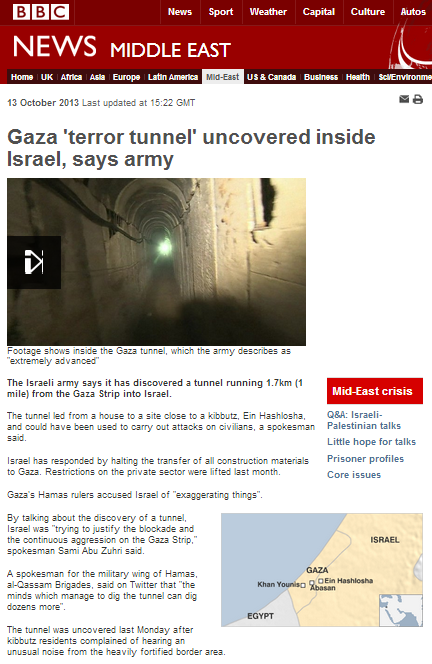
In addition, the complainant referred to the use of quotation marks in on-line news reporting, and quoted the BBC College of Journalism style guide:
Beware of paraphrasing and selective quotation, e.g.: “The Israeli prime minister said that while ‘terrorist’ attacks continued he would not back down.” Putting the single word ‘terrorist’ in quotes may give the impression that the BBC is sceptical about the prime minister’s assessment of the nature of the attacks.
The complainant then listed some examples in support of his belief that the BBC always puts the word ‘terrorist’ into quotes when used in the context of the Israel/Palestine dispute, but not when the word is used in the context of politically motivated acts of violence within the UK.”
However, the Trust’s Senior Editorial Strategy Adviser came to the conclusion that it was not appropriate for the Trust’s ECU to consider the issue, stating inter alia that:
“…decisions relating to the editorial content of news reports were matters for the BBC Executive. The Royal Charter and the accompanying Agreement between the Secretary of State and the BBC drew a distinction between the role of the BBC Trust and that of the BBC Executive Board, led by the Director-General. “The direction of the BBC’s editorial and creative output” was specifically defined in the Charter (paragraph 38, (1) (b)) as a duty that was the responsibility of the Executive Board, and one in which the Trust did not get involved unless, for example, it related to a breach of the BBC’s editorial standards. The Adviser did not consider that Trustees would be likely to conclude that there had been a lapse of editorial standards in this case.”
Of course if “there is no general approach and decisions are taken on a case-by-case basis” – as stated by BBC representatives – then it is clearly difficult to identify a “lapse of editorial standards” even when the use – or lack of it – of the word ‘terror’ is clearly influenced by political factors.
Sadly, the BBC Trust does not appear to appreciate the necessity of discussing the effect that the opaquely worded BBC Guidance document titled “Language when Reporting Terrorism” and the editorial guidelines on the same subject are having on increasingly deteriorating audience perceptions of its impartiality.
Related articles:
Another ‘last-first’ BBC headline in report on attack on Israeli soldier
BBC not sure cross-border tunnel intended for terror?
Debate widens on BBC avoidance of the word terrorist
BBC revises report on Israeli soldier killed in Hebron
BBC report on murder of Tomer Hazan revised
Additions to stock BBC euphemisms for terrorist
BBC shows footage of ‘apparent rocket attack’ on north Israel
BBC describes known terror finance man as ‘activist’
Terror in Tel Aviv: scare quotes at the BBC
Where can terrorism be named as such by the BBC?
More evidence of BBC double standards on terrorism
Stop press! BBC uses word ‘terrorist’!

